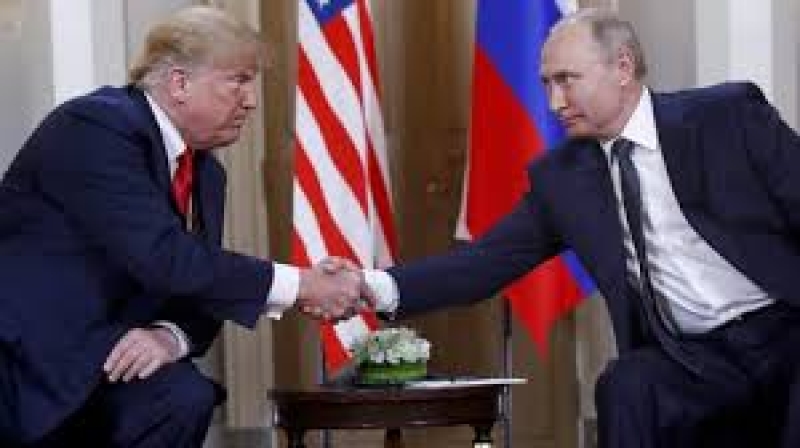- Security Council Divided on United States' Venezuela Action |
- Over 1.53m voters register for postal balloting: Shafiqul Alam |
- Bangladesh Bank to liquidate 9 NBFIs in financial sector reforms |
- Govt Moves to Clear Tk20,000cr Dues to Avoid Summer Outages |
- Maduro Pleads Not Guilty in US Court, Claims Presidency |
Trump Warns Putin to End War or Face New Sanctions

Donald Trump has issued a stern warning to Russian President Vladimir Putin, threatening to impose high tariffs and additional sanctions on Russia unless the war in Ukraine is brought to a swift end.
In a post on his social media platform, Truth Social, Trump said he was offering Russia and Putin "a very big favour" by urging them to settle the ongoing conflict. The former U.S. president, who has previously claimed he could resolve the war in a single day, reiterated his belief that an agreement could be reached quickly if Russia agreed to negotiate.
While Russia has yet to formally respond to Trump’s comments, senior Russian officials have recently suggested that a limited window for diplomacy remains with the new U.S. administration. Putin himself has repeatedly expressed a willingness to negotiate, but only if Ukraine accepts Russia's territorial gains, which currently amount to approximately 20% of Ukraine’s land. Moscow also insists that Ukraine must abandon any aspirations to join NATO, the military alliance of Western nations.
Ukrainian President Volodymyr Zelensky, however, has made it clear that Kyiv will not surrender its territory, though he has acknowledged the possibility of temporarily ceding some currently occupied areas to facilitate peace talks.
On Tuesday, Trump stated in a news conference that he would be speaking to Putin "very soon" and hinted at the likelihood of more sanctions if the Russian president failed to engage in meaningful negotiations. The following day, Trump took to Truth Social to intensify his rhetoric, declaring, "I'm going to do Russia, whose economy is failing, and President Putin, a very big favour. Settle now, and STOP this ridiculous war! IT'S ONLY GOING TO GET WORSE. If we don't make a deal soon, I will have no choice but to impose high tariffs, taxes, and sanctions on anything Russia sells to the U.S. and other participating countries."
Trump emphasized that the war, which he claims would never have started had he been president, could be ended quickly through negotiations. "We can do it the easy way, or the hard way – and the easy way is always better," he wrote. "It's time to MAKE A DEAL."
Trump’s former special representative for Ukraine, Kurt Volker, supported the former president’s position, asserting that the threat of increased sanctions would send a clear message to Putin that the situation would only worsen unless the Kremlin moved toward a ceasefire. Volker added, "We should incentivize Putin to say, 'OK, it's time to have a ceasefire.'"
However, Russian officials, including Deputy UN Ambassador Dmitry Polyanskiy, have said that Moscow needs more clarity on what Trump is demanding in a peace deal before taking any steps forward.
Meanwhile, at the World Economic Forum, Ukrainian President Zelensky called for a significant peacekeeping force of at least 200,000 troops, with U.S. participation, to serve as a realistic deterrent to Russia. Zelensky stressed that no other country would be willing to risk confronting Russia without the United States’ involvement.
Although some in Ukraine may appreciate Trump’s more aggressive tone, particularly his emphasis on strength in dealing with Russia, there is skepticism in Kyiv. Many Ukrainian leaders and citizens are waiting for concrete actions rather than mere words. Trump has not specified where or when the new sanctions might be imposed, and current sanctions already severely limit Russian imports to the U.S. The most significant Russian exports to the U.S. include phosphate-based fertilizers and platinum.
Volker pointed out that Russia’s economy could suffer "substantial" damage if Trump chooses to intensify or maintain the existing sanctions, which were implemented by Trump’s successor, Joe Biden. “Russia really didn’t feel as much pressure as they could have,” Volker noted.
On social media, many Ukrainians were critical of Trump’s threats, arguing that more sanctions would be an insufficient response to Russian aggression. For them, the central question remains what, if any, terms Putin is willing to discuss at the negotiating table.
In Moscow, some are beginning to suggest that the Kremlin may be preparing Russian citizens for the possibility of a less ambitious outcome to the war, acknowledging that Russia may have to settle for less than its original war goals. Pro-Kremlin TV editor Margarita Simonyan has started to discuss "realistic" conditions for ending the conflict, which could involve halting the fighting along the current frontlines, leaving the four Ukrainian regions that Russia illegally annexed still partially under Kyiv’s control.
This has sparked outrage among Russian hardliners, who are angry at what they view as defeatism.
Trump's position on the war is crucial, but his shift in tone could be seen as a sign of changing priorities. After nearly 11 years of conflict with Russia and numerous failed peace deals, many in Ukraine are cautious, waiting to see whether words will lead to meaningful action.
As the war enters its third year, both Ukraine and the world remain uncertain about the potential for a lasting resolution, with many hoping that the pressure on Russia will finally force a change in its stance.

